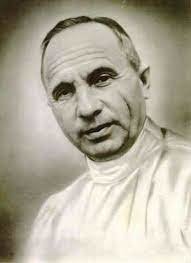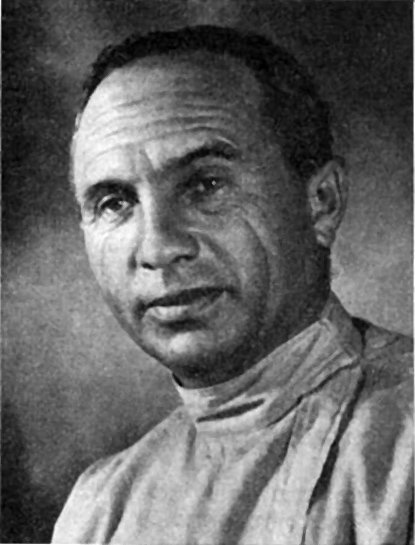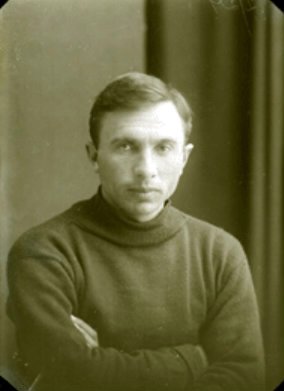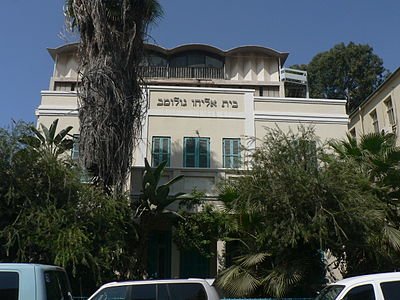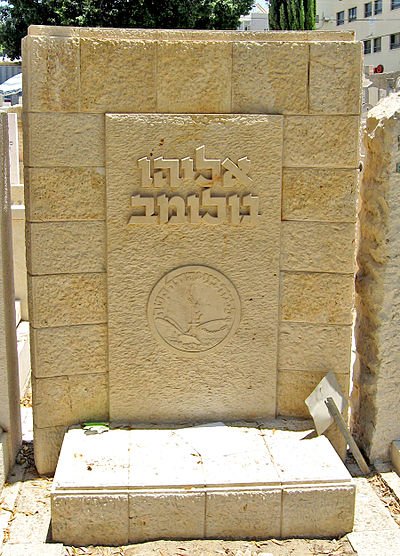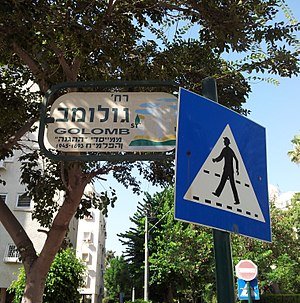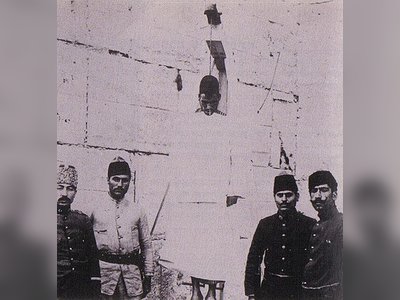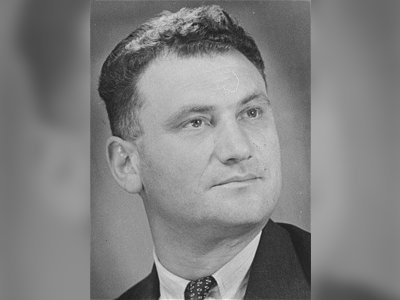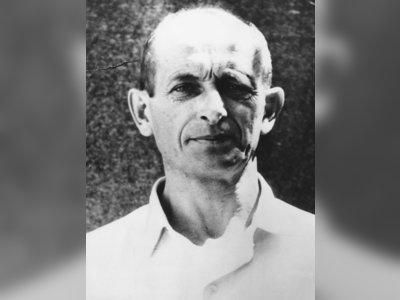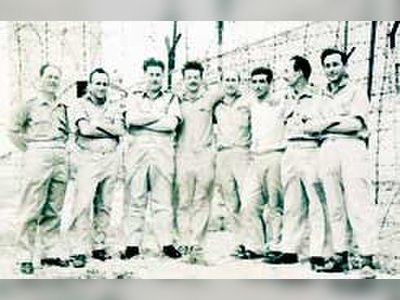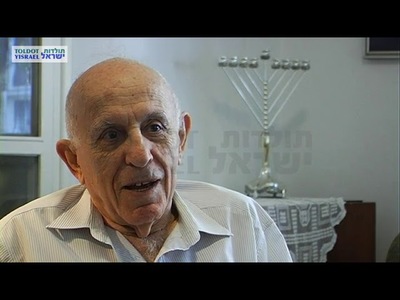מורשת גדולי האומה
בזכותם קיים
beta
Eliyahu Golomb: The Unsung Leader of the Haganah
Eliyahu Golomb, born on March 2, 1893, and passing away on June 11, 1945, is a name often overlooked in the annals of history, but his contributions to the defense of Jewish settlements in Mandate-era Israel are nothing short of remarkable.
Known as the "Unofficial Commander" of the Haganah organization, Golomb played a pivotal role in shaping the Jewish self-defense forces in the region during a tumultuous period. He was not only a central figure in the Haganah's leadership between 1920 and 1930 but also served as the Chief Commander of the Haganah from 1931 to 1945. Furthermore, he was among the founders of the Histadrut (General Federation of Jewish Labor) and the Histaḏrut ha-Qlali (General Federation of Labor).
Early Life and Immigration to Eretz Israel
Eliyahu Golomb was born in Volkovysk, in the Russian Empire, on the 14th of Adar in 1893, to parents Neftali and Esther Klar. In his youth, he attended a Russian gymnasium and became acquainted with revolutionary ideas and Russian literature. In 1909, his parents sent him to Eretz Israel to study at the Herzliya Gymnasium. They followed him in 1911 and settled in Tel Aviv, where his father, a miller in Russia, established a similar business in Jaffa.
Golomb belonged to the first graduating class of the Herzliya Gymnasium in 1913, which included notable figures such as Moshe Sharett (Shertok) and Dov Hoz, his future brother-in-law (collectively known as the "Four Cousins").
After completing his studies, Golomb, along with his friends, organized the "Limited Graduates' Association of the Gymnasium." This group laid the groundwork for the first pioneering youth defense forces in the land of Israel. This initiative operated in Degania Aleph and Kinneret. Tragedy struck in November of the same year when two of Golomb's comrades, Moshe Barsky and, later, Yosef Zaltzman (from the Kinneret group), were brutally murdered. These events deeply affected the group, as depicted by Ahuvia Malkin in his book "The Activist," stating that "the severe events and the tension that followed had a profound influence on the Gymnazists, noticeable throughout their lives." Following these events, Golomb realized that agricultural work and settlement alone were insufficient without the means to defend them. He believed that a combination of labor and defense was essential for securing a lasting presence in the land.
In 1914, Golomb's father passed away, and he had to return to Tel Aviv to manage the family's flour mill. Initially, Golomb did not see any issue with operating the mill on Saturdays, as there were instances of emergency work on the Sabbath at Degania and Kinneret. However, religious workers at the mill refused to work on Saturdays, leading Golomb to realize that this was a matter of national importance. He had to protect the Jewish right to observe their religious customs. As a result, he was fined by the Ottoman authorities for his refusal to work on the Sabbath. This humiliation was a pivotal moment that drove Golomb to initiate the founding of the Haganah.
Golomb resisted conscription into the Ottoman army, believing that the Ottoman Empire was in decline, as did many others. In 1917, when the British took control of the land from the Turks, Golomb volunteered for the Jewish Legion.
The Birth of the Haganah
After World War I, Golomb established the "Yefuneh Group," which was dedicated to self-defense and maintained close ties with the Hashomer organization.
Golomb endured humiliation and oppression due to his refusal to work on the Sabbath. To seek vengeance against Hesan Bak, the official responsible for his punishment, Golomb even obtained a weapon. Fortunately, his close friend Dov Hoz realized the situation and disarmed him. During a lengthy conversation, Hoz persuaded Golomb that personal vengeance would not bring any benefit. Instead, they decided to establish an organization for the defense of Jewish settlements throughout the land. In June 1920, the Haganah organization was formed. With its creation, Golomb supported the dismantling of the Hashomer organization and played a prominent role in mediating conflicts with its leadership, headed by Israel Shohat.
Golomb was one of the founders of the Haganah and served as its commander for many years. During his leadership, he focused on procuring weapons abroad, primarily from Vienna, Paris, and Berlin. Golomb was sent abroad by the Haganah between 1922 and 1924 to purchase weapons and organize groups of young pioneers in Europe.
Golomb worked to legitimize the Haganah organization under a legal framework, initially under the General Federation and later under the national authorities.
Golomb stood out as a leader in the Haganah leadership, representing the younger generation that grew up in Eretz Israel. It was an organization of the people, welcoming anyone willing to defend it. The Haganah followed the directives of the public and political leadership, with the goal of protecting not only property, life, and honor but also the Zionist enterprise.
Political and Public Activities
Golomb was one of the founders of the Histadrut and the General Federation of Labor. He was a member of the National Committee and a delegate to the Zionist Congresses. He played a crucial role in organizing Aliyah Bet (illegal Jewish immigration to Palestine) during the Mandate period and was one of the initiators of the plan to rescue Haganah members from Europe during the Holocaust.
His Family
Golomb was deeply in love with his sister-in-law, Rivka, who was a close friend and confidante. However, she married his friend Dov Hoz. Later in life, he married her younger sister, Ada, who bore him three children: Dikla, David (Dudik), and Dalia. His son David went on to become a member of the Knesset. His daughter Dalia married Asher Yadlin and is a prominent figure in the organization "Machsom Watch."
Eliyahu Golomb passed away from a cerebral hemorrhage at his home in Tel Aviv on the 30th of Sivan, 5705 (1945). He was laid to rest in the Trumpeldor Cemetery in Tel Aviv, close to his close friends Dov Hoz and his family. His brother-in-law Moshe Shertok and his wife were also buried there. In subsequent years, Golomb and his wife Ada raised Rami Shertok, the younger sister of Ada. Rami Golomb later became a theater researcher and a professor at Tel Aviv University.
Eliyahu Golomb's name lives on:
His house, "Beit Eliyahu," on Rothschild Boulevard in Tel Aviv, served as the Haganah's headquarters and now houses the Haganah Museum, the Haganah Archives, and the offices of the Association of Haganah Veterans.
Early Life and Immigration to Eretz Israel
Eliyahu Golomb was born in Volkovysk, in the Russian Empire, on the 14th of Adar in 1893, to parents Neftali and Esther Klar. In his youth, he attended a Russian gymnasium and became acquainted with revolutionary ideas and Russian literature. In 1909, his parents sent him to Eretz Israel to study at the Herzliya Gymnasium. They followed him in 1911 and settled in Tel Aviv, where his father, a miller in Russia, established a similar business in Jaffa.
Golomb belonged to the first graduating class of the Herzliya Gymnasium in 1913, which included notable figures such as Moshe Sharett (Shertok) and Dov Hoz, his future brother-in-law (collectively known as the "Four Cousins").
After completing his studies, Golomb, along with his friends, organized the "Limited Graduates' Association of the Gymnasium." This group laid the groundwork for the first pioneering youth defense forces in the land of Israel. This initiative operated in Degania Aleph and Kinneret. Tragedy struck in November of the same year when two of Golomb's comrades, Moshe Barsky and, later, Yosef Zaltzman (from the Kinneret group), were brutally murdered. These events deeply affected the group, as depicted by Ahuvia Malkin in his book "The Activist," stating that "the severe events and the tension that followed had a profound influence on the Gymnazists, noticeable throughout their lives." Following these events, Golomb realized that agricultural work and settlement alone were insufficient without the means to defend them. He believed that a combination of labor and defense was essential for securing a lasting presence in the land.
In 1914, Golomb's father passed away, and he had to return to Tel Aviv to manage the family's flour mill. Initially, Golomb did not see any issue with operating the mill on Saturdays, as there were instances of emergency work on the Sabbath at Degania and Kinneret. However, religious workers at the mill refused to work on Saturdays, leading Golomb to realize that this was a matter of national importance. He had to protect the Jewish right to observe their religious customs. As a result, he was fined by the Ottoman authorities for his refusal to work on the Sabbath. This humiliation was a pivotal moment that drove Golomb to initiate the founding of the Haganah.
Golomb resisted conscription into the Ottoman army, believing that the Ottoman Empire was in decline, as did many others. In 1917, when the British took control of the land from the Turks, Golomb volunteered for the Jewish Legion.
The Birth of the Haganah
After World War I, Golomb established the "Yefuneh Group," which was dedicated to self-defense and maintained close ties with the Hashomer organization.
Golomb endured humiliation and oppression due to his refusal to work on the Sabbath. To seek vengeance against Hesan Bak, the official responsible for his punishment, Golomb even obtained a weapon. Fortunately, his close friend Dov Hoz realized the situation and disarmed him. During a lengthy conversation, Hoz persuaded Golomb that personal vengeance would not bring any benefit. Instead, they decided to establish an organization for the defense of Jewish settlements throughout the land. In June 1920, the Haganah organization was formed. With its creation, Golomb supported the dismantling of the Hashomer organization and played a prominent role in mediating conflicts with its leadership, headed by Israel Shohat.
Golomb was one of the founders of the Haganah and served as its commander for many years. During his leadership, he focused on procuring weapons abroad, primarily from Vienna, Paris, and Berlin. Golomb was sent abroad by the Haganah between 1922 and 1924 to purchase weapons and organize groups of young pioneers in Europe.
Golomb worked to legitimize the Haganah organization under a legal framework, initially under the General Federation and later under the national authorities.
Golomb stood out as a leader in the Haganah leadership, representing the younger generation that grew up in Eretz Israel. It was an organization of the people, welcoming anyone willing to defend it. The Haganah followed the directives of the public and political leadership, with the goal of protecting not only property, life, and honor but also the Zionist enterprise.
Political and Public Activities
Golomb was one of the founders of the Histadrut and the General Federation of Labor. He was a member of the National Committee and a delegate to the Zionist Congresses. He played a crucial role in organizing Aliyah Bet (illegal Jewish immigration to Palestine) during the Mandate period and was one of the initiators of the plan to rescue Haganah members from Europe during the Holocaust.
His Family
Golomb was deeply in love with his sister-in-law, Rivka, who was a close friend and confidante. However, she married his friend Dov Hoz. Later in life, he married her younger sister, Ada, who bore him three children: Dikla, David (Dudik), and Dalia. His son David went on to become a member of the Knesset. His daughter Dalia married Asher Yadlin and is a prominent figure in the organization "Machsom Watch."
Eliyahu Golomb passed away from a cerebral hemorrhage at his home in Tel Aviv on the 30th of Sivan, 5705 (1945). He was laid to rest in the Trumpeldor Cemetery in Tel Aviv, close to his close friends Dov Hoz and his family. His brother-in-law Moshe Shertok and his wife were also buried there. In subsequent years, Golomb and his wife Ada raised Rami Shertok, the younger sister of Ada. Rami Golomb later became a theater researcher and a professor at Tel Aviv University.
Eliyahu Golomb's name lives on:
His house, "Beit Eliyahu," on Rothschild Boulevard in Tel Aviv, served as the Haganah's headquarters and now houses the Haganah Museum, the Haganah Archives, and the offices of the Association of Haganah Veterans.
- אליהו גולומב – ויקיפדיהhe.wikipedia.org
